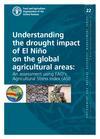Understanding the drought impact of El Niño on the global agricultural areas
Understanding the drought impact of El Niño on the global agricultural areas

During El Niño episodes the normal patterns of tropical precipitation and atmospheric circulation become disrupted triggering extreme climate events around the globe: droughts, floods and affecting the intensity and frequency of hurricanes. Disasters create poverty traps that increase the prevalence of food insecurity and malnutrition. Agriculture is one of the main sectors of the economy that could be severely affected by El Niño event. FAO monitors the El Niño-Southern Oscillation (ENSO) phenomenon, among other weather related hazards, with a special focus on the potential impacts on the agricultural sector. The objective of this study is to enhance understanding the El Niño phenomenon using FAO’s Agricultural Stress Index System (ASIS). This study is carried out under the auspices of the new FAO Strategic Framework, for the Strategic Objective 5 “Increase the resilience of livelihoods to threats and crises”. The study outcomes are expected to enhance further discussions on our understanding of the El Niño Phenomenon and add to the growing literature. This would in turn improve effective early warning capabilities of FAO and partners to issue and trigger timely disaster risk reduction measures.







